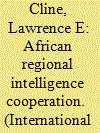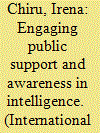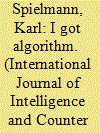|
|
|
Sort Order |
|
|
|
Items / Page
|
|
|
|
|
|
|
| Srl | Item |
| 1 |
ID:
145318


|
|
|
|
|
| Summary/Abstract |
Considerable attention has been paid in recent years to improved intelligence sharing among Western countries in an effort to face common threats.1 Most studies have focused on efforts by the United States with other states or among such coalitions as the North Atlantic Treaty Organization (NATO) or International Security Assistance Force (ISAF) in Afghanistan. Considerably less attention has been devoted to intelligence sharing efforts in other parts of the world. Africa in particular represents a good area for examining regional approaches to intelligence sharing.
|
|
|
|
|
|
|
|
|
|
|
|
|
|
|
|
| 2 |
ID:
145323


|
|
|
|
|
| Summary/Abstract |
Although post-2006 executive branch efforts to discourage unauthorized disclosures have been politically contentious, historical cases illustrate that the Espionage Act of 1917 has broad utility in prosecuting unauthorized information transfer, also known as “leaking.” Multiple United States federal courts, including the Supreme Court, have consistently upheld the Espionage Act and worked to clarify the statute through judicial interpretation. Late 1930s and early 1940s decisions, including the only Supreme Court hearing on the Espionage Act of 1917, re-affirmed the logic and legality of the Act. The 1941 Supreme Court decision, Gorin v. United States (1941), formed the primary legal precedent for the case of Rosen v. United States (2006), which began the recent U.S. government legal campaign to prosecute the unauthorized release of sensitive defense related information. Specifically, the 1930s cases established that the intent of the government employee, the “sensitivity” of the material transferred, or the status of the recipient were not mitigating factors.
|
|
|
|
|
|
|
|
|
|
|
|
|
|
|
|
| 3 |
ID:
145320


|
|
|
|
|
| Summary/Abstract |
In democracies the efficiency of a national security institution depends significantly on the way its role and mission are perceived by the intelligentsia and the general public. “Social capital,” an asset for all institutions, conditions their efficient functioning in the limits of the law. Consequently, the intelligence culture, understood as a set of explicit and implicit attitudes and behaviors related to intelligence which influence social perceptions, is fundamental for allowing the public to trust and support their country's intelligence services, given that trust is directly correlated with the efficiency of national security institutions. Political as well as security community legitimacy is acquired, preserved, validated, or eroded through actions, just as their public image is built through adequate communication policies.
|
|
|
|
|
|
|
|
|
|
|
|
|
|
|
|
| 4 |
ID:
145322


|
|
|
|
|
| Summary/Abstract |
Nate Silver is a prominent statistician/statistical probability analyst who, among other achievements, may be best known for making a very accurate prediction of President Barack Obama's victory and its dimensions in the 2012 election.1 In doing so, he probably redeemed (at least partially) the reputation of sophisticated mathematical modeling that was badly tarnished by its association with the poor investment decisions that brought the financial debacle of 2008.2 Does Silver have a potential counterpart in the intelligence business, where predicting the nature and likelihood of threats is a central concern, and what would that person have to do to rise to the occasion?
|
|
|
|
|
|
|
|
|
|
|
|
|
|
|
|
| 5 |
ID:
145324


|
|
|
|
|
| Summary/Abstract |
Three hitherto neglected MI5 documents have been released to The National Archives (TNA): “Notes on the General Organization of a Counter-Espionage Bureau” that MI5 sent to officials in the Colonies in 1915 (KV1/16, Appendix B); notes on “Preventive Intelligence Duties in War” produced by MI5 in 1918 (KV1/37, Appendix O); and, a section on “Detective Intelligence Work” within the G Branch Report (KV1/39, pp. 1–17). These documents make possible a closer look at MI5's activities and principles in the early 20th century.
|
|
|
|
|
|
|
|
|
|
|
|
|
|
|
|
| 6 |
ID:
145325


|
|
|
|
|
| Summary/Abstract |
In early 2015 John Brennan, the Director of the Central Intelligence Agency (DCIA), announced a major reorganization of the CIA, presumably to conform more closely to what the U.S. political leadership now demands and will presumably continue to demand of its intelligence agency in the future. Brennan is certainly aware that the last 25 years have not been kind to the conduct of American espionage. The first decade of downsizing and neglect in the post-Soviet/post-Cold War 1990s was followed by years of focus on transnational interests like terrorism and on a few countries of then-priority interest, to the neglect of other current and future intelligence issues. While that first decade witnessed a decline in CIA resources and support for espionage, the period after the attacks on the World Trade Center and Pentagon of 11 September 2001 (9/11) witnessed an increase in both categories but remained concentrated in a few crisis areas.
|
|
|
|
|
|
|
|
|
|
|
|
|
|
|
|
| 7 |
ID:
145319


|
|
|
|
|
| Summary/Abstract |
As Poland emerged from decades of Communist rule, its political course was uncertain. The expectations among advanced democratic countries that Poland would evolve into a full-fledged democratic polity were certainly high, despite serious political and socio-economic challenges. After all, Poland lacked a democratic tradition and respect for the rule of law, and its political culture was long at ease with strong leaders and authoritarian institutions. Its economy was weak, its legal culture and judicial system were in need of rebuilding, and it suffered from political fragmentation.1 More importantly, without strong political institutions, a new and effective legal framework, and in-depth socio-economic reforms, a serious concern developed among would-be Polish reformers and astute foreign observers that the country's intelligence services could pose an obstacle to its democratic development, and endanger the political, social, economic, and human rights of its citizens. Ultimately, the intelligence services were indeed sources of controversy, political infighting, and alleged abuses, but not to the extent of preventing Poland from moving ahead as a recognized democracy within the polity of nations.
|
|
|
|
|
|
|
|
|
|
|
|
|
|
|
|
| 8 |
ID:
145321


|
|
|
|
|
| Summary/Abstract |
In September 2015, news reports surfaced that more than 50 U.S. intelligence analysts working with the U.S. Central Command (CENTCOM) had filed complaints with the Pentagon's inspector general alleging that their analysis was manipulated by senior officials to downplay the threat from ISIS and the al-Nusra Front (the al-Qaeda branch in Syria).1 The journalists reported that management had altered the analysts' assessments to bolster the Obama administration's claim that the U.S. was making progress in defeating the Islamist terrorist groups.
|
|
|
|
|
|
|
|
|
|
|
|
|
|
|
|
| 9 |
ID:
145317


|
|
|
|
|
| Summary/Abstract |
In wartime, border controls on the movements of individuals increase tremendously, because national authorities become additionally concerned that spies from an enemy state might seek to enter the country to gather information or conduct other covert operations. Historically, the need to identify potential enemies has led states to adopt instruments by which to associate a certain name with a place of origin. The best known of these tools is the passport. That a rudimentary form of passport was introduced as early as during the French Revolution to prevent counter-revolutionary agents from mingling with other travelers in order to safely cross borders is no coincidence. A similar control method was put in place during the Napoleonic Wars.1 Interestingly, serious passport control almost fell into disuse all throughout the 19th century, when economic prosperity and overall political stability positively encouraged free movement of individuals as a driving force for further development, only to be resumed as late as during the First World War, remaining permanent since then.2 In conflict zones, such controls are more stringent than in areas of the world where two or more states have created strong political and economic bonds. Europe's Schengen area, giving almost unlimited access across borders, is the most obvious example of discrepancy in the mobility of European and non-European citizens.
|
|
|
|
|
|
|
|
|
|
|
|
|
|
|
|
|
|
|
|
|